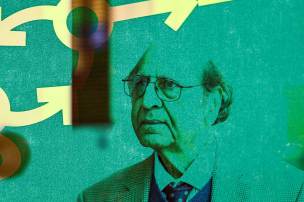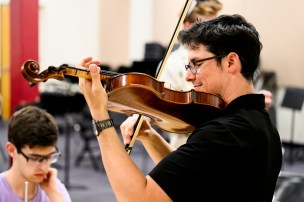Published on
From front lines in Iraq to Filipino jungles, Special Forces veteran goes from combat to computer science classroom
After 22 years in the service, Dennis Hernandez is putting the Iraqi desert and mountains of Nepal behind him. Now, he’s back home in Boston, starting a degree at Northeastern and a security company.
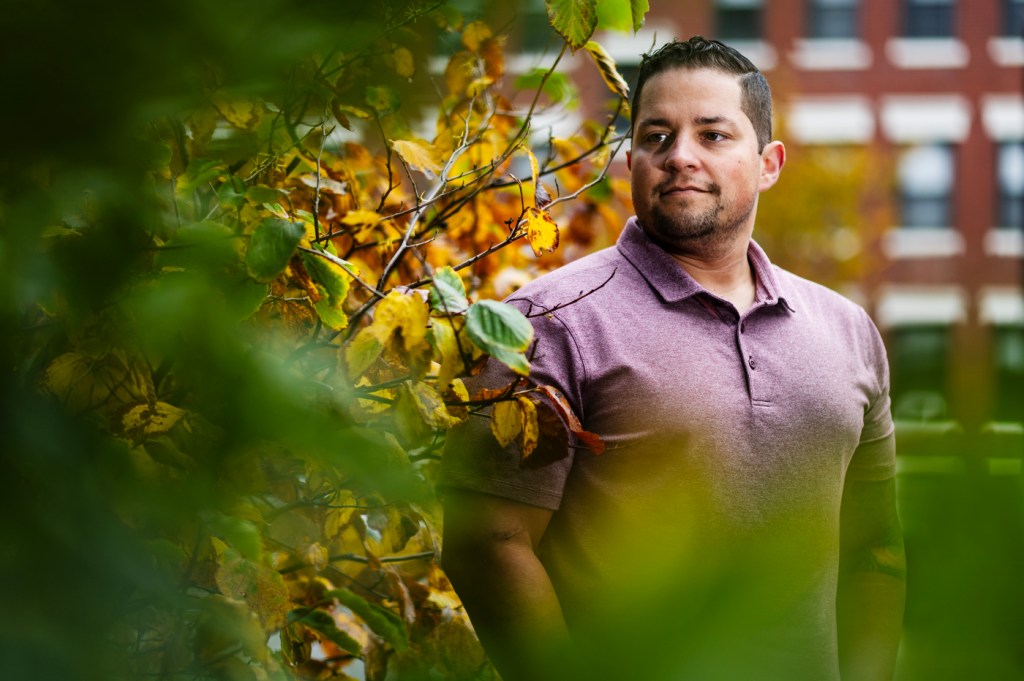
Dennis Hernandez spent most of his career being a ghost.
A veteran of the U.S. Army Special Forces, commonly known as the Green Berets, Hernandez can blend into a crowd so well he disappears. He can identify the exits in a building almost immediately, even if he’s never been there before.
Hernandez’s more than two decades of serving in the Army, Green Berets and deployed National Guard has sent him across the globe, from the deserts of Iraq to the mountains of Nepal and jungles of the Philippines. Now, he’s back home in Boston, pursuing a graduate degree in computer science at Northeastern University and starting his own security company, Apparition.
He says all that movement, all that constant change and adaptation, has helped make him into a chameleon. So, it makes sense that the place he’d be most uncomfortable is in the spotlight.
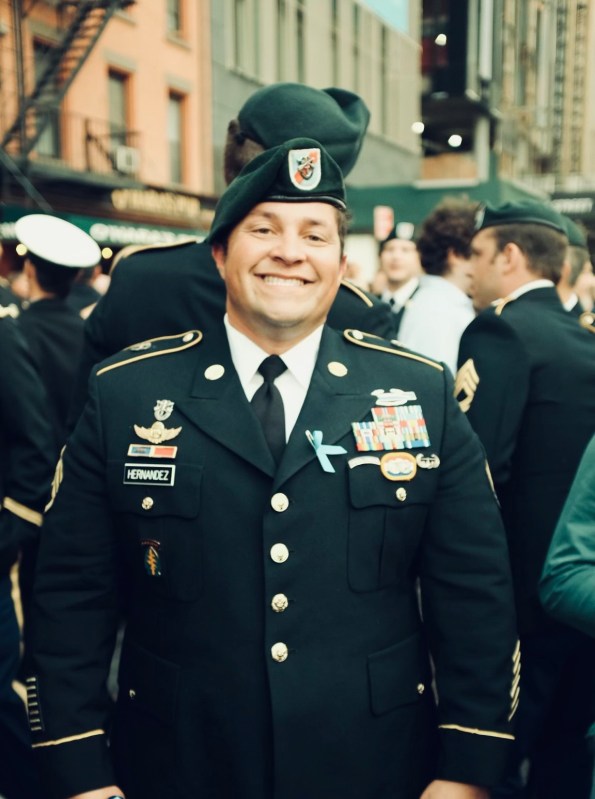
When Northeastern Global News reached out about sharing his story, Hernandez expressed some hesitation, not because he’s uncomfortable talking about his life and service. He’s just used to downplaying his own accomplishments and blending into the background. But it all comes back to the reason he spent most of his life in the military, why he started his own company and why he’s at Northeastern as a student and a teaching assistant.
“I never thought I’d be a TA, but it’s the same reason I started the company: Be the change you want to see,” Hernandez says. “I wanted to come in and help. … I like helping, I like teaching –– it’s just what I’ve done for so long.”
It might sound strange to many civilians that a Special Forces veteran is so passionate about education. But contrary to the image most people have of the Green Berets, Hernandez says it’s the biggest part of the job.
“Our job isn’t just combat; our job is training and teaching,” Hernandez says. “That’s what sets us apart from other special operations forces out there. We go into countries, we go in under the cover of darkness, surreptitiously, and we train them how to defend themselves to fight against a tyrannical government.”
Some children might play at being a soldier; Hernandez saw the Green Berets as his future. His father, who had served in the Army until the mid-2000s, and his mother thought otherwise.
“As much as he and my mother did not want me to join the military, I wanted to,” Hernandez says. “I remember when I was in fifth grade, about 9 or 10, telling my father, ‘I want to join the Army, and I want to be a Green Beret.’ I, ultimately, ended up doing that, but I knew I wanted to for a long time.”
Infantry in Iraq
When Hernandez was entering the armed forces in the early 2000s, the only way to enter the Special Forces was by serving –– and being promoted –– in the military for a few years. So, he entered basic training for the U.S. Army infantry in 2001, just in time for the attacks on the World Trade Center towers on Sept. 11.
In 2003, he shipped out with his division, the 101st Airborne, and the rest of the U.S. armed forces for Iraq.
He still remembers the sensory and emotional overload of being airlifted into the country.
“Of all of the helicopters that had gone inside to clear the path for the mass amount of us that were getting lifted in, only one didn’t come back with a bullet hole in it,” he says. “One of them had a rocket that [had been] shot at it stuck in its winglet and [it] was still going.”
Hernandez was physically overloaded as well. At the time, he was a mortarman and had to carry a large mortar base plate, ammo and other equipment that weighed about 140 pounds. Hernandez weighed around 190 pounds. During long troop movements, trudging through shifting sand, Hernandez says that most of what he saw was the ground.
The first year he was in Iraq was defined by two- to three-month stretches of little activity leading up to five minutes of “loud noises and excitement.” Hernandez says he never felt “an overwhelming sense of dread” at the idea of entering combat but something more like “acceptance.”
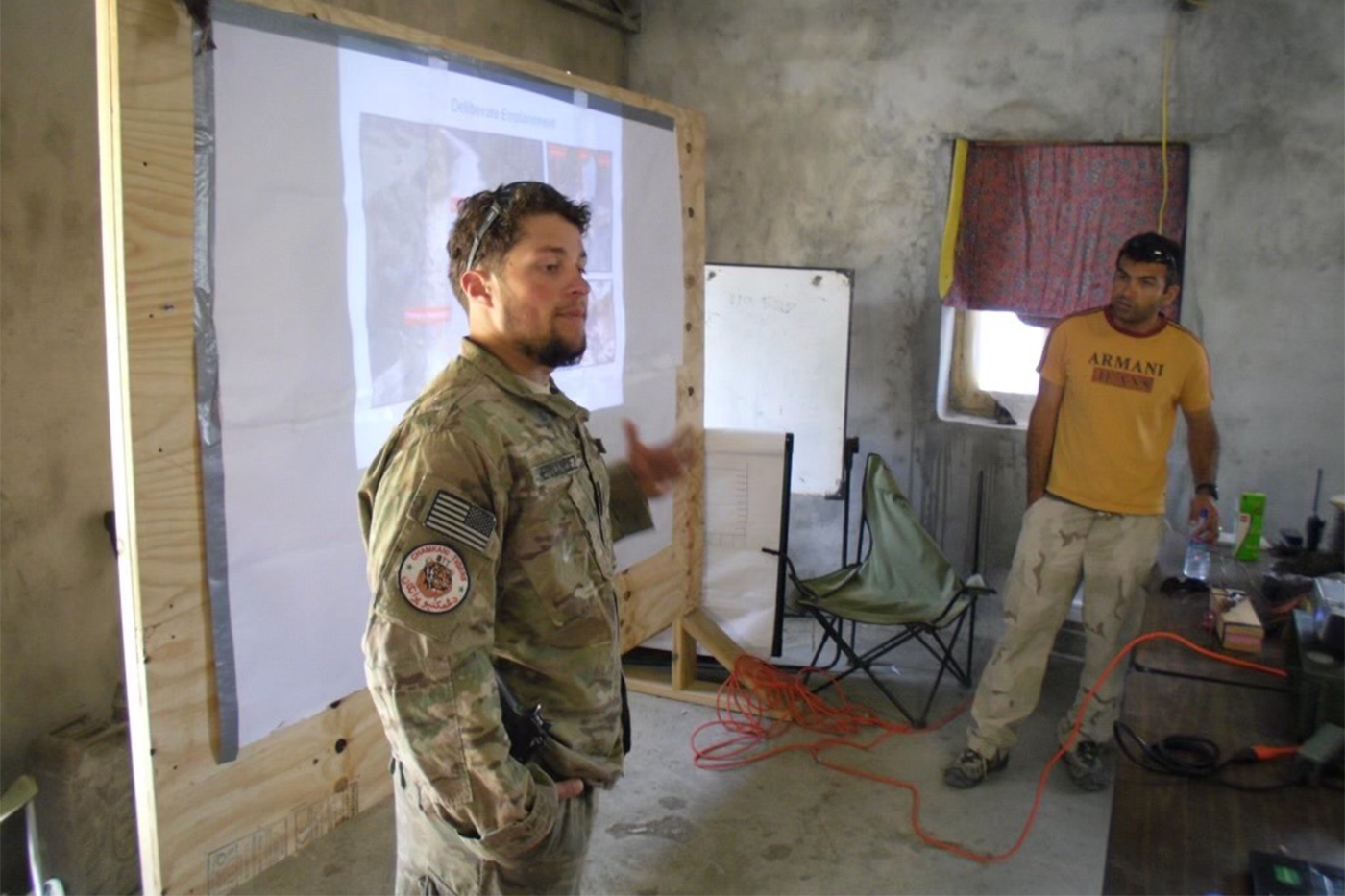
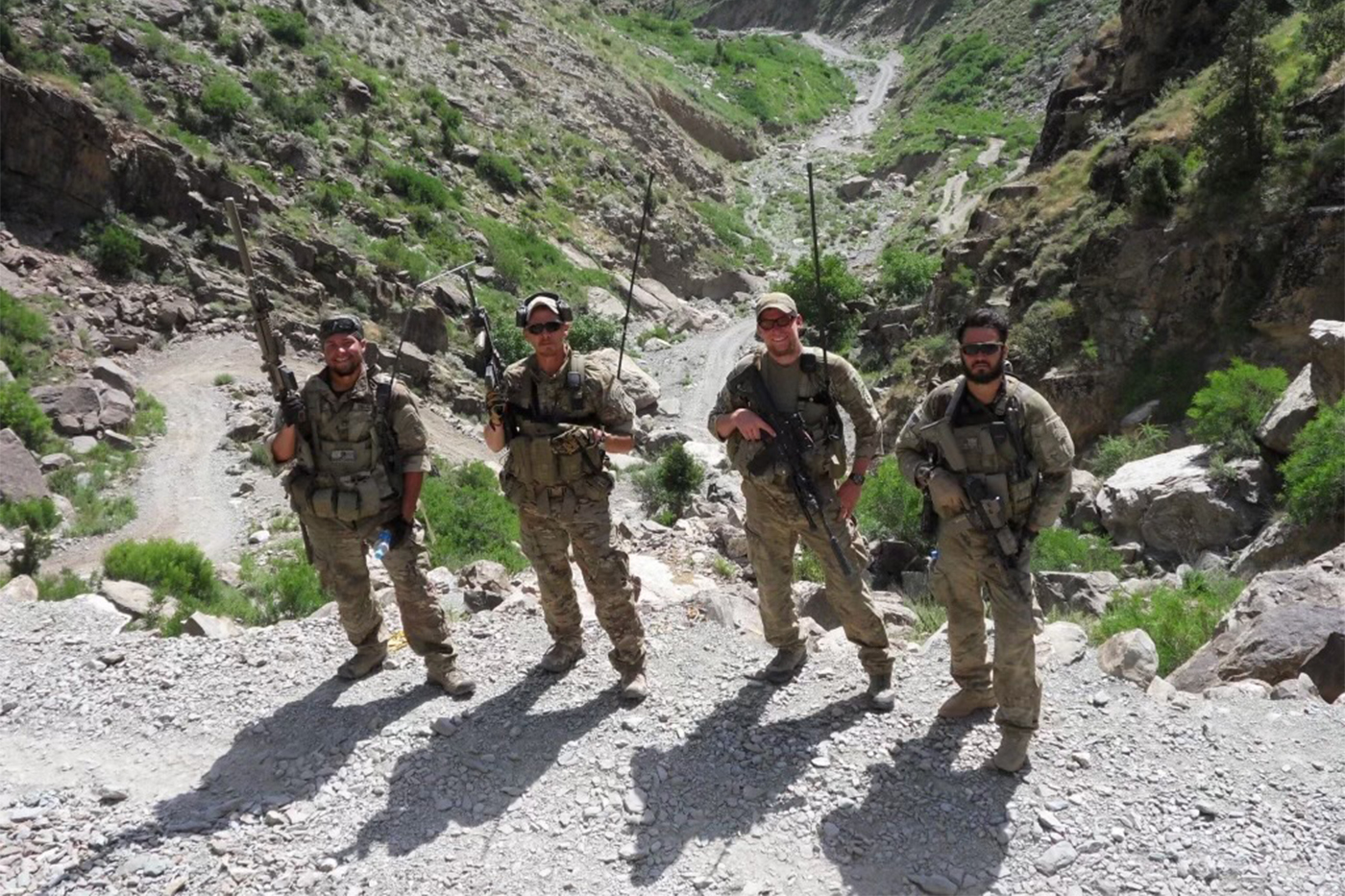
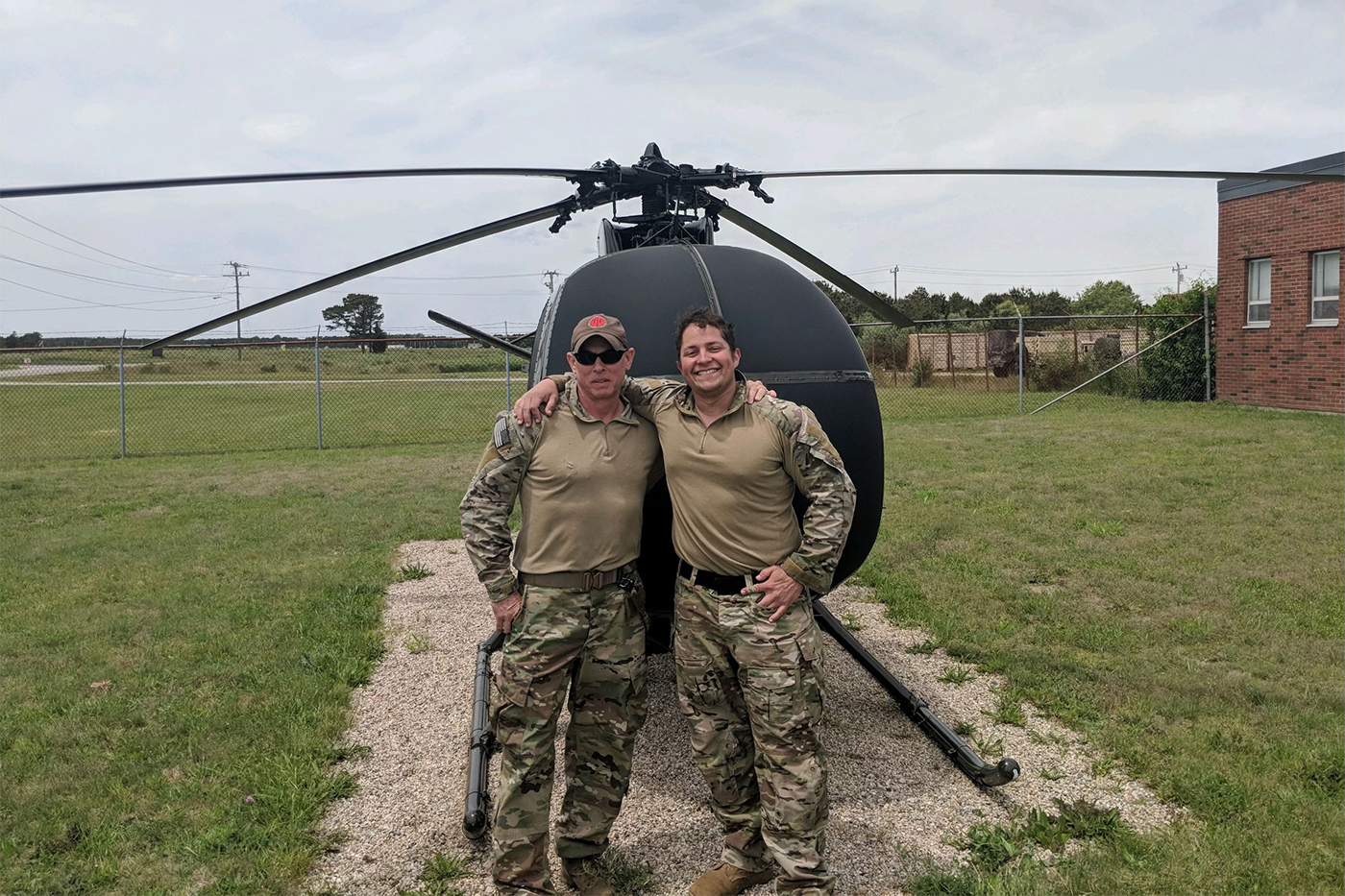
When you’re going to raid a house, when you’re going to do any of these missions or movements, the way I think of it is, it’s anxiety, anxiety, anxiety until the moment you have to start working and then it all goes out the window,” he says.
During the initial invasion of Iraq, Hernandez says the Iraqi army had a habit of taking over and stationing in hospitals and schools, which his unit had to go through, “clearing it as carefully as possible.”
“I don’t know how to put this lightly,” Hernandez says before pausing for a moment, “but they were slaughterhouses.”
However, sometimes the Iraqi army would abandon a site before U.S. forces even arrived, leaving behind a scene that was straight out of a Vietnam War movie, Hernandez recalls.
“There was still rice boiling, not even fully cooked but getting there, as we were getting into the schools,” he says. “Uniforms dropped, civilian clothes dropped, guns everywhere, and they just walked away. It made it so we didn’t have to shoot anybody or they didn’t have to shoot at us, but it was odd.”
A dream come true
Between 2003 and 2006, Hernandez went to Iraq in back-to-back-to-back deployments. By the time he had completed his deployment in 2006, he and many soldiers in his division were burnt out after “an interestingly rough year.”
“Our larger element had lost the most people, collectively, at that time,” Hernandez says. “It was a very, very hectic year. We lost a lot of people that year, not even our unit specifically but most of the units around us. That was a [terrible] year, but there’s so many years like that.”
The situation became so dire that the Army sent human resources personnel to Hernandez’s brigade to tell them they wouldn’t be sent back overseas. Instead, Hernandez and his brigade were given options for training posts in the U.S. where they “could go to and relax.”
Hernandez chose Florida, where he worked as a boat team leader in the third and final phase of ranger training. It was a welcome change of pace after consecutive deployments. It was also a chance to train for Special Forces selection and pursue his childhood dream.
Hernandez did not get selected the first time. “There are a lot of things I’ve had to do twice, but every time I come back,” he says.
When he officially entered the Green Berets in 2008 as an engineer sergeant, Hernandez knew there was no going back. He noticed one key difference almost immediately: autonomy.
“You’re not micromanaged,” he says. “You’re told, ‘Here’s your job. Figure it out.’ I love that.”
He was stationed in Okinawa, Japan, and deployed to help train special operations units in Asia, including the Philippines, Nepal, Thailand and “almost every other country in Asia.” From 2008 to 2013, when Hernandez left active duty, he was, in his own way, a teacher and a student.
The arrangements between the Green Berets and operatives in other countries are called Joint Combined Exchanges of Training, JCETs, for a reason.
“We were teaching the commandos in Nepal to combat anti-poaching missions in their national forests,” Hernandez says. “That’s a major issue within their borders, so we trained them on that and they trained us on their mountain techniques. It was incredible to see them go up and down the forests around Nepal and Everest like it’s nothing, while I take one step and I’m sucking for air.”
Later, Hernandez trekked through the jungles on an island in the Philippines with Filipino rangers and their special forces as they launched an operation against the Moro Islamic Liberation Front and Abu Sayyaf Group. In the mornings, he would fish and hunt for his food.
“Not many military in America can say they’ve done something like that,” Hernandez says. “It was really cool, and at the same time we’re doing it for a decent reason.”
Learning not just the military techniques but the cultures of other people and teaching them about his own, that was his mission. Here, his chameleonic abilities came in handy.
“If I’m in a place for long enough, I’ve noticed that I’ll pick up an accent,” Hernandez says. “I’ll not intentionally do it, and I’ll kind of feel like an [jerk] when I catch myself. I do it to try to make most people as comfortable as possible around me, which has helped.”
“I like learning,” he adds. “There’s so much interesting stuff out there that I’m never going to know, but I want to.”
Leaving active duty
Hernandez loved the work he was doing with Green Berets –– it was professionally and personally enriching. But a long line of leaders who, he says, were “out for themselves,” started to diminish the parts of the job he enjoyed.
He made the decision to leave active duty in 2013, but he couldn’t stay away for long. It was the world –– and people –– he knew best. A few months after leaving active duty, he joined a Special Forces company in the National Guard in Chicopee, Massachusetts.
Once again, he was a globetrotting chameleon. He was stationed in Uganda as part of a special forces element assisting with Operation Observant Compass, an anti-child trafficking mission. Hernandez embarked on six-month stints abroad, helping the operation’s goals in Uganda, the Democratic Republic of the Congo, South Sudan and Central African Republic. During the same time he also worked high threat security details as a civilian contractor.
The other six months of the year, Hernandez attended classes at Suffolk University, where he eventually earned a bachelor’s degree in finance in 2020.
I’ve had power. I’ve had incredible amounts of power, and to me it was just a job. That doesn’t make me happy, that doesn’t fulfill me. What really makes me happy is doing software stuff, coding, making a good product, doing a good job, helping people.
Dennis Hernandez, a computer science masters student and Army Special Forces veteran
In September, Hernandez retired after 22 years of service, mostly because he’s embarked on three new adventures. He married his wife, a Blackhawk helicopter pilot, in 2020, started a master’s of computer science program at Northeastern and founded a security company, Apparition, in 2022.
“I hate stereotypes, and a Special Forces dude owning a security company is the last thing I ever wanted to do,” he says. “I still feel so weird saying it, but I have to lean into it. It’s what I do now.”
Apparition started as a way for Hernandez to use the skills he had acquired over a career in the Special Forces in his post-military life. He started wading into the world of executive security and quickly developed a reputation for getting results quickly and quietly. Oftentimes, his clients don’t want their family, particularly their children, to know about potential security threats they’re facing.
“I’ve blended into many places in many countries around the world; I can blend into the city I’m from,” Hernandez says. “One of our clients, their kids were shopping at Neiman Marcus, one of these really fancy places. We were never (more than) two arms’ length away –– they never knew we existed. We were always there making sure they were safe.”
His main goal with Apparition is to reward the highly skilled security personnel who he says are undervalued –– and underpaid –– in the industry. He set up an app that functions as a virtual job board and assigns executive security jobs, and more recently private investigative work, to a roster of 71 contractors, most of whom are coming straight out of the Special Forces, Navy SEALs, CIA, DIA, DEA.
And if it comes at the cost of his own paycheck? He’s fine with that.
“I’m not making money on this –– I wish I was making money on this,” Hernandez says. “I’m sure there’s a point where I can and I will, but I’m not worried about it. … I’m going to go out there and get people as much money as I possibly can, and in that aspect I’m at least trying to do what I can.”
If Apparition is firmly in his comfort zone, the Align MS in computer science program at Northeastern is far outside it. It’s a field he had always been interested in but “something I thought I wasn’t smart enough to do.” And at 40 years old, raising his hand in class to ask questions is far more intimidating than entering a combat zone. But Hernandez welcomes the challenge.
“At the end of the day I want to be happy, and it took me many, many years to just realize that,” Hernandez says. “I’ve had power. I’ve had incredible amounts of power, and to me it was just a job. That doesn’t make me happy, that doesn’t fulfill me. What really makes me happy is doing software stuff, coding, making a good product, doing a good job, helping people.”
Cody Mello-Klein is a Northeastern Global News reporter. Email him at c.mello-klein@northeastern.edu. Follow him on X/Twitter @Proelectioneer.



